We want it both ways. As investors we want higher oil prices because of the increased profits reaped in by energy companies but as consumers we want the lower prices. The investor view took precedence on Friday. Stocks dropped in Asia and Europe along with crude prices as the lower prices took their toll on company shares. Indexes that are heavily weighted with energy companies such as the FTSE were hard hit, but others were negatively affected as well. Investors other than those in Hong Kong appeared to overlook the benefits of lower fuel costs that would accrue to heavy industrial users such as airlines for example. The dollar initially benefited from dropping crude prices but was virtually unchanged on the week. Stocks were up everywhere with the exception of Japan, UK and France.
Global Stock Market Recap

Europe and the UK
Shares on the FTSE, CAC and DAX traded erratically last week. However on Friday, the negative effect of lower oil prices was exacerbated by sinking U.S. housing starts data compounding investor gloom. Housing starts plummeted in October to the lowest level since 2000 - the combined effect of sliding home sales and swollen inventories. The big European exporters such as DaimlerChrysler were negatively affected. Copper and other metals declined in London trading on concern that the slowing U.S. housing industry will cut demand for pipes and wires. Oil prices dropped on speculation that OPEC would exceed its production target despite intentions to scale it back. (OPEC has always had difficulty in enforcing lower production limits.) Of late, oil and basic resources stocks have been spooked by signs of U.S. economic weakness. On the week, the DAX managed to hold onto some of its gains but the CAC and FTSE did not.

Shopping relief
Berlin has voted to allow retail stores to open around the clock six days a week and on ten Sundays a year, something not seen since the end of the 19th century. In doing so, Berlin has scrapped a 50-year-old law that restricted store opening hours severely. Other German regions are expected to follow. The decision ends nearly two decades of emotional discussions about the country's notorious Ladenschlussgesetz, or store-closing law. Since its first, timid relaxation in 1989, the rules have been held as an archetypal symptom of Germany's inability to embrace change. In scrapping the law, Berlin becomes the first of Germany's 16 states to take advantage of the reform of the country's federal system which in June extended the legislative rights of regional parliaments. Once other states have adopted their own laws, Germany should have some of most liberal shopping legislation in continental Europe.
Asia/Pacific
Japanese stocks were down for the third week as energy-related companies shares dropped on easing oil prices to drag the Topix and Nikkei down. Energy-related stocks were down, led by Mitsubishi Corp. - it generates the second-biggest proportion of its sales from selling crude and industrial fuel. The All Ordinaries also lost ground, but this was the first time since the week ending on September 22nd that the index was down. Hong Kong's stocks were up for a seventh week, the longest winning streak in more than three years. And the Hang Seng set another record high at the same time, soaring above the 19,000 level and then solidifying its position there. Exporters climbed on speculation lower fuel costs will boost consumer spending in the U.S. and Europe. Airlines including Cathay Pacific Airways Ltd. were up on hopes that jet-fuel costs would decline along with crude prices.

Bank of Japan does the expected
The Bank of Japan, as expected, left its policy interest rate at 0.25 percent last week. But analysts did not receive much guidance from Governor Toshihiko Fukui's comments after the meeting. When questioners tried to pin him down on whether rates will rise before the end of 2006, he said the Bank could change its interest rate at any time. A majority of economists expect the Bank of Japan to increase borrowing costs next quarter to prevent excessive business investment and asset bubbles. The world's second-largest economy expanded at twice the expected pace in the third quarter, led by corporate spending and exports.

Fukui also said investors haven't reached a consensus over when the next rate increase will be. When asked whether there would be any difference between raising rates in December or January, Fukui said the exact timing would be insignificant as long as the decision is made based on a thorough assessment of economic and price data. A spate of weak economic data, including declines in machinery orders and household spending, doesn't mean the bank has to alter its outlook made in a semi-annual report last month, Fukui said. Strength in the corporate sector is slowly but steadily spreading to consumers.
Currencies
The dollar ended the trading week virtually unchanged from the previous Friday. U.S. data such as the CPI showed that inflationary pressures have weakened. But investors put more credence in the view expressed in the October FOMC minutes. They indicated that the Federal Reserve will take its time to cut interest rates given concerns that inflation remained to high for their liking. Some analysts thought that slipping oil prices were also supporting the dollar. Crude slumped to its lowest levels in a year following forecasts of a mild U.S. winter.

The drop in both crude prices and U.S. consumer prices, according to some analysts, would continue to support carry trades, where investors borrow in currencies with low interest rates to invest in higher-yielding assets elsewhere. The popularity of this trade has seen low-yielding currencies such as the yen and the Swiss franc suffer in recent months.
Indicator scoreboard
EMU - Third quarter flash gross domestic product was up 0.5 percent and 2.6 percent when compared with the same quarter a year ago. As with all flash releases no detail on components is provided.

September industrial production was down 1 percent but up 3.3 percent when compared with September of 2005. Output declined in Italy, France, Spain and Germany. Consumer durable goods output sank by 3.3 percent after increasing 4.2 percent in the previous month. Both capital goods and consumer nondurable goods were down 0.5 percent after jumping 1.9 percent and 0.7 percent respectively in August.

October harmonized consumer price index was up 0.1 percent and 1.6 percent when compared with last year. Prices were up for clothing & shoes and tobacco while energy prices were down. Excluding energy, the HICP was up 1.8 percent on the year.

September unadjusted merchandise trade surplus was €2 billion after a deficit of €5.4 billion in August. Exports jumped by 15.4 percent while imports were up 8 percent. On a seasonally adjusted basis, the picture was different. The September balance remained negative, with a deficit of €0.9 billion, an improvement from August's €3.3 billion deficit. Adjusted exports were up 2 percent while imports edged down by 0.1 percent.

Germany - Third quarter flash gross domestic product was up 0.6 percent and 2.8 percent when compared with the same quarter a year ago. The Statistics Office said that the quarterly growth reflected increased net trade as well as higher investment and private consumption. No detail are available with flash releases.

November ZEW economic outlook survey among financial experts declined to minus 28.5 from minus 27.4 in October. The index has now declined in each month since reaching a peak of 71 in January 2006. The decline has been attributed in part to the expected increase in the VAT beginning on January 1, 2007. ZEW surveyed 298 analysts and institutional investors for this month's survey. It is conducted by the Centre for European Economic Research (ZEW) in Mannheim. The participants were asked from October 30 to November 13 about their medium-term expectations concerning economic activity and capital markets. The ZEW Indicator of Economic Sentiment shows the balance between positive and negative expectations regarding future economic activity in Germany within a timeframe of six months.

Britain - October producer output prices were down 0.2 percent but up 1.7 percent when compared with the same month a year ago. Output prices excluding food, beverages, tobacco and petroleum prices were up 0.3 percent and 2.5 percent on the year. Producer input prices were down 0.1 percent but up 3.7 percent on the year. The monthly input price decline reflected drops in prices for crude oil and home produced food. Core input prices were up 0.3 percent and 2.5 percent on the year.

October consumer price index was up 0.2 percent and 2.5 percent when compared with last year. A drop in gasoline prices offset increases in university tuition fees and food prices. In its release, National Statistics confirmed that the Bank of England's Monetary Policy Committee did see these data ahead of its decision to hike interest rates last week. The CPI remains above the Bank's 2 percent inflation target. Core CPI, which excludes energy, food, alcoholic beverages and tobacco, was up 0.2 percent and 1.4 percent on the year. The retail price index excluding mortgage interest payments was up 0.1 percent and 3.2 percent on the year.

Average earnings for the three months to September were up 4 percent when compared with the same three months a year ago. Excluding bonuses, earnings were up 3.5 percent compared with the same three months a year ago.

October claimant count unemployment was up by 1,200 but the claimant rate remained at 3 percent. ILO unemployment for the three months to September increased by 27,000. The ILO unemployment rate edged up to 5.6 percent from 5.5 percent in the previous three months ending in August.

October retail sales volumes were up 0.9 percent and 4 percent when compared with last year. All spending sectors were up with non-store retailing & repair (includes online spending) and department store spending both up 2.5 percent. Other increases included household goods which were up 1.1 percent and textile, clothing & footware up 1.9 percent.
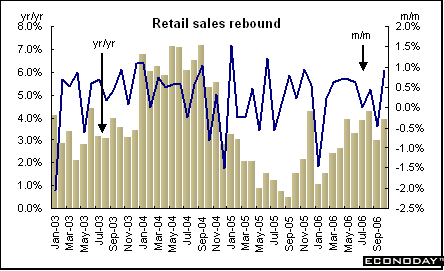
Asia
Japan - October corporate goods price index was down 0.3 percent but up 2.8 percent when compared with last year. The index measures prices that businesses pay for energy and raw materials such as iron ore and aluminum. The CGPI's decline was the first since June 2005.
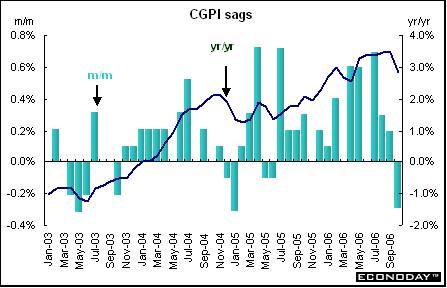
Third quarter gross domestic product was up 0.5 percent and 2.7 percent when compared with the same quarter a year ago. On an annualized basis, GDP was up 2 percent. Strong export growth was the largest contributor to overall growth while private consumption and investment weakened. The GDP price deflator was down 0.8 percent, an improvement from the 1.2 percent drop in the second quarter.
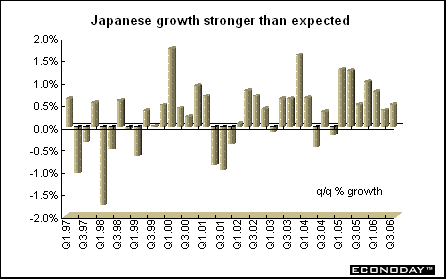
September tertiary index dropped 1.3 percent and was up 0.6 percent when compared with last year. The index is a gauge of money spent on services such as retail and communications. Wholesale and retail trade declined 3.1 percent while information & communications sank 2.9 percent and finance & insurance was down 1.7 percent. However medical, health care & welfare were up 1.1 percent and eating & drinking places & hotels were up 1 percent.
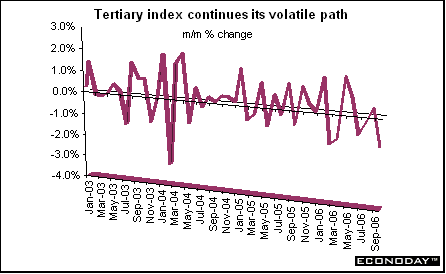
Americas
Canada - September factory shipments sank 3.3 percent and were down 3.8 percent when compared with the same month a year ago. The decline was due to sluggish activity in the transportation sector and lower prices for petroleum and coal products. After adjusting for price fluctuations, shipments were down 1.2 percent. Shipments were down in 13 of 21 manufacturing industries and 3 were unchanged in September. Durable goods shipments tumbled 2.5 percent because of the transportation sector's third monthly decrease in a row, and sixth in the last nine months. Nondurable goods shipments were down 4.2 percent because of declining commodity prices. New orders plummeted 2.8 percent and 4.3 percent on the year while unfilled orders sank 0.9 percent and 1.6 percent on the year.
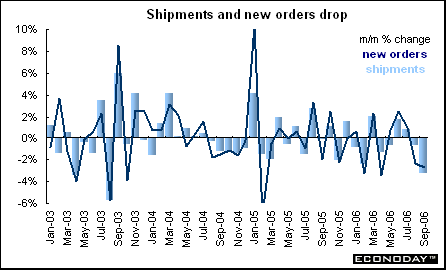
Bottom line
The past week was highlighted by flash gross domestic product releases from many of the Eurozone Member States. They were for the most part equal to or slightly below expectations. One first estimate of third quarter GDP did surprise - that of Japan. Prior to its release, many analysts were expecting a flat to negative quarter. But they were surprised on the upside. This in turn renewed talk of an imminent interest rate increase by the Bank of Japan. After its meeting, Governor Fukui left analysts guessing as to when the next increase will in fact occur.
The calendar is light this week, and the U.S. will be celebrating Thanksgiving Day which will make for a short trading week for many. But there is a full slate of new data available the following week (see the two week Looking Ahead below) as market participants begin to focus on the upcoming Bank of England and European Central Bank meetings scheduled for the first week of December. Reading central bank tea leaves is a preeminent financial market activity!
Looking Ahead: November 20 through November 24, 2006

Looking Ahead: November 27 through December 1, 2006

Anne D Picker is the author of International Indicators and Central Banks, which will be published by John Wiley and Sons in January 2007.

